Is Tattooing Halal? Exploring the Halal Perspective
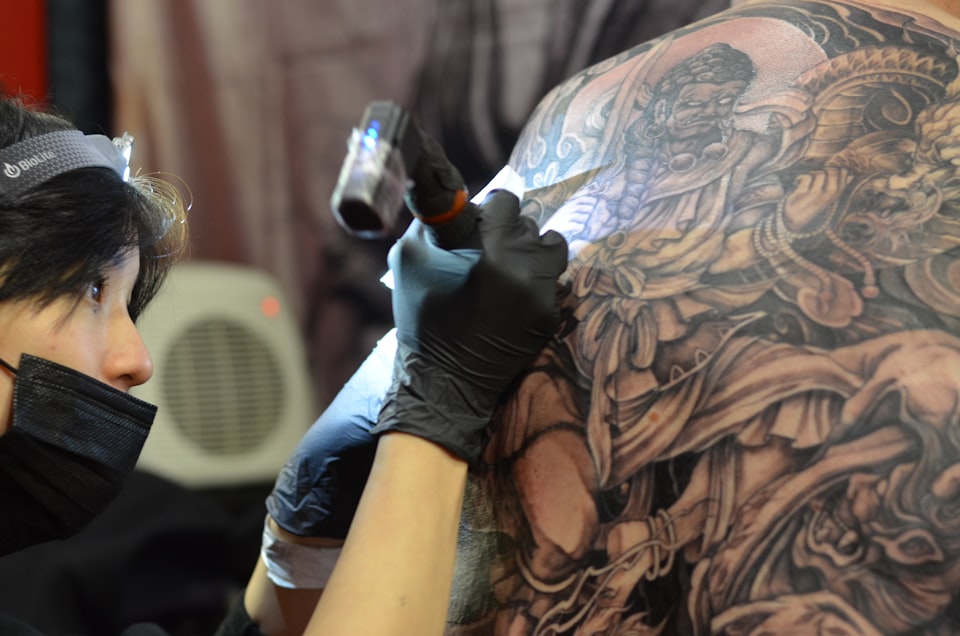
Young Muslims in the West are becoming more and more fond of tattoos. However, tattoos are considered to be sinful because they alter God's natural creation. They create needless suffering in the process.
In mainstream Islamic thought, getting a tattoo is forbidden, as the Prophet Muhammad (ﷺ) considered it to be one of the primary sins. The Messenger of Allah (ﷺ) chastised the person getting tattoos and the one getting made wigs in a Hadith that Ibn Umar narrated (Bukhari).
It is also crucial to understand the dangers involved in having a tattoo. Common risk factors include the occurrence of the following conditions:
- Bloodborne infections
- keloids
- Allergic reaction
- And other reactions
The Halal Perspective in Life
The Islamic faith is based on halal principles, which cover daily life, ethical consumption, and dietary limitations. You respect Muslim customs and beliefs by being aware of them.
-
Understanding Halal needs promotes inclusivity in a varied world. This can occur in places of employment, learning environments, or even social events including food.
-
Most Muslims treat Islam's laws and prohibitions with the utmost reverence and meticulously apply them to their daily lives. Islam offers thorough responses to inquiries concerning our daily lives.
Key Principles Guiding Halal Practices
- It is Allah's right to make something lawful and to forbid it.
- Permissibility (permissible-origin) is the fundamental asl (origin) concept.
- If something is haram, it is unnecessary; halal is enough.
- It is the same as shirk to forbid the halal and allow the haram.
- Inherently haram is everything that supports it.
- Because certain items are toxic and impure, they are prohibited.
- If there is a law against doing something, there is also a law against asking someone to do it.
- Things that are subject to prohibitions return to their previous legal status when those prohibitions are lifted.
- It is haram to do bad things.
- The preference is toward prohibition in cases where it conflicts with an emergency. As a result, something that someone has provided to a creditor as security for a debt cannot be sold to another person.
- It is not allowed to falsely portray the haram as halal.
- In legal terms, an accessory that is legally attached to an object is inherently linked to it; for instance, when an animal is sold when pregnant, the young inside its womb are likewise sold with it.
- For everyone, the haram is forbidden.
- One should stay away from doubtful things.
- Exemptions are required by necessity.
- Forbidden things become permissible in certain cases when they are necessary.
Tattooing: An Overview
Definition
The art of permanently putting ink or pigment under the skin to create a design is known as tattooing. It's a custom that has a deep and varied cultural past.
History of Tattooing
Ancient mummified human bones with preserved tattoos demonstrate that tattooing has been done for millennia worldwide. Ötzi was determined to be the earliest known tattooed mummy in 2015 after a scientific re-evaluation of the ages of the two oldest known examples.
-
This body, which had 61 tattoos, was discovered in 3250 BCE and encased in glacial ice in the Alps. The world's oldest figurative tattoos were found on two Egyptian corpses in 2018 that date from 3351 to 3017 BCE.
-
The Austronesian people were big tattoo artists in the past. The usage of unique obsidian skin piercers by Papuans and Melanesians has also been linked to ancient tattooing traditions.
-
The Ainu people of Japan, some Austroasians of Indochina, Berber women of Tamazgha (North Africa), the Yoruba, Fulani, and Hausa people of Nigeria, Native Americans of the Pre-Columbian Americas, and the Welsh and Picts of Iron Age Britain were among the other ethnic groups who had tattoos customarily.
-
Martin Hildebrandt was the first known professional tattoo artist in the United States. He had acquired his trade as a soldier in the American Civil War, joined the US Navy in the late 1840s, and founded a business in New York City in the early 1870s.
-
Sutherland Macdonald was the first known professional tattoo artist in Britain in the early 1880s, operating out of a permanent workshop and tattooing members of the paying public. For Europe's crowned rulers, getting a tattoo was a symbol of riches by the late 1880s, but it was also a costly and painful procedure.
-
The first electric tattoo machine was patented in 1891 by New York City tattoo artist Samuel O'Reilly, who modified Thomas Edison's electric pen.
-
During the 1970s, tattoos gained popularity. It was a prominent feature of Western and international fashion, appealing to all age groups and both sexes, from late adolescence to middle age.
-
The expansion of tattoo culture has led to a huge influx of new artists, With training in fine arts and technical proficiency, these artists joined the tattoo industry.
-
This has improved the quality of tattoos being created, especially when combined with improvements in tattoo pigments and a continuous improvement of tattooing equipment.
Common Motivations for Getting Tattoos
-
The acceptance of tattoo art is growing in today's culture. In both Western and Eastern cultures, tattoos have become increasingly common in recent years. The main implications attached to tattoos include spirituality, ritual, and the cultural identity of different cultures and traditions.
-
As tattoo artists become renowned for their work, more people of all ages, genders, and public locations are getting tattoos.
-
As a result, tattoos are becoming increasingly common, setting them apart from other kinds of art and cultural customs. Religious leaders and practitioners of many religions have differing opinions on this issue.
People these days get tattoos for a wide range of reasons:
- Self-Expression: Tattoos represent one's values, hobbies, or personality.
- Celebration: Honoring special moments, occurrences, or accomplishments.
- Aesthetics: Recognition of the elegance and talent in tattoo design.
- Belonging: Identification with a specific group or subculture.
- Empowerment: Taking charge of one's appearance and physique.
Cultural and Societal Perceptions of Tattoos
Tattoos are thought to have been applied in religious and therapeutic contexts. Egyptians used tattoos to help with identification between the deceased in the afterlife. Tattoos are a symbol of dedication and protection in many Eastern faiths. Although tattoos are generally frowned upon or prohibited in Islam, Judaism, and Christianity, they are widely used in Buddhism and Hinduism.
For a variety of reasons, tattoos are still widely accepted in many modern cultures. Certain societies use tattoos as a form of identification, making their members easily identifiable based on the placement or design of a particular tattoo.
The Ta Moko tattoo, which is typically put on the lips, chin, and occasionally the nostrils of women, is the most well-known feature of the Maori people of New Zealand. Many people today still have tattoos, albeit they usually choose to have them on their arms, shoulders, or chest.

At first, they served as representations of authority, prestige, rank, and social standing. They are still venerated and ritualized today; for some, it is part of their rite of passage into adulthood.
In the Samoan culture, men get tattoos called pe'a, which typically extends from the waist to the knees, and women get malu, which is a more elaborate design that typically extends from the knees to the upper thighs.

For Samoans, these stand for dignity, respect, prestige, power, and communal pride.
Today's Context
The way society regards tattoos has drastically changed over the period of time. Getting a tattoo used to be taboo in the US during the 1980s and earlier. This is by no means surprising.
Parents were kept in the dark about them. Potential superiors needed to be kept in the dark about them. A noticeable tattoo would have been a potential barrier to entrance if you wanted to live an affluent lifestyle.
That's all changed, somehow.
Nowadays, between the ages of 26 and 40, around 40% of Americans have tattoos on their skin. Seeing them on our instructors or employers is not shocking. These days, many accept tattoos as legitimate forms of expression on par with pierced ears or hairstyles.
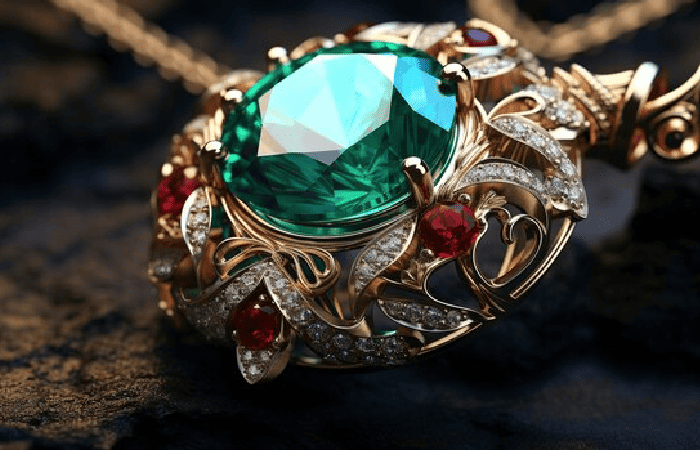
Is Tattooing Halal?
Let's understand the Islamic principles and hadith relating to tattooing which makes it forbidden in Islam.
the Islamic Perspective on Tattooing
Tattoos are strictly forbidden in Islam, as per the Prophet Muhammad's (ﷺ) classification of them as serious sins. This is the overall perspective.
According to a Hadith recounted by Ibn 'Umar (Bukhari), the Messenger of Allah (ﷺ) reportedly cursed the person who tattooed them and the one who made and wore wigs. This clearly indicates how some behaviors—like getting a tattoo for aesthetic reasons or wearing hair extensions—are forbidden in islam.
عن عبد الله بن مسعود رضي الله عنه أن النبي صلى الله عليه وسلم: "لعن الواشمات والمستوشمات، والنامص والمتنمصات، والمتفلجات للحسن المغيرات خلق الله تعالى."
According to hadith narrated by Abdullah ibn Mas'ud, ladies who do tattooing and those who are tattooed are cursed. As are people who remove facial hair and make spaces between their teeth for aesthetic purposes. This amounts to changing the creation that Allah created (Muslim). You should understand how grave these deeds are and how they run counter to Allah's created order.
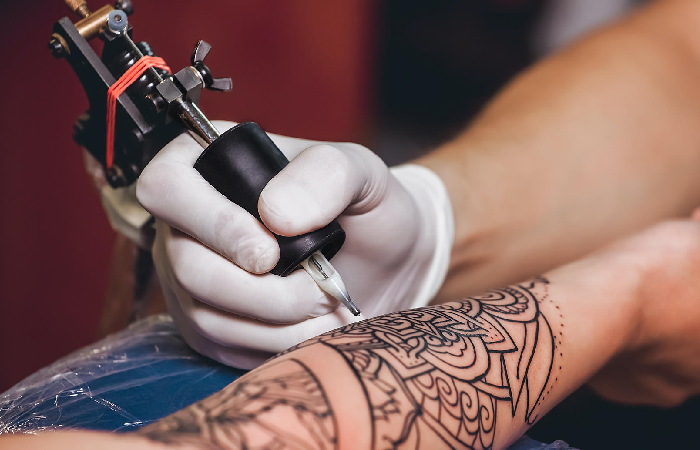
Following the hadith of Prophet Muhammad (ﷺ) is an essential aspect of Islam. Because tattooing modifies the body without any justifiable purpose or advantage, it is specifically forbidden. It is regarded as a violation of Allah's creation. Therefore, Islamic teachings contain strong evidence that generally speaking, forbids tattooing.
Tattooing is viewed as a departure from the divine design, akin to physical abuse, disfigurement, and needless adornment. Ayats of Surah Nisa, prohibit changing God's creation, classifying it as one of Satan's directives.
According to 'Abdullah, the Prophet (ﷺ) chastised women who get tattoos, those who want to get tattoos, and ladies who shave their faces in an attempt to change Allah's creation in order to be more beautiful.
Insights from Islamic Scholars and Jurists
The Discussion's Foundation:
Hadiths, or the sayings of the Prophet Muhammad, are at the center of the controversy. While some hadiths are considered to expressly forbid tattoos, others are believed to be ambiguous.
The Haram viewpoint on the arguments against tattoos
- Modifying Allah's Creation: According to certain academics, it is disrespectful to permanently alter a person's physical makeup.
- Pain and Bodily Harm: Some scholars believe that getting a tattoo should be discouraged since it can be painful and lead to needless harm.
- Potential Health Risks: Some scholars are concerned about the potential for infections or allergic reactions brought on by tattooing.
- Similarities to Customs Prior to Islam: Certain pre-Islamic societies practiced tattooing, and some scholars believe that this was a taboo activity throughout that era.
The Justifications for Constrained Permissibility
- Emphasis on Intent: A minority viewpoint places special emphasis on the tattoo's intended use. It might be okay if it's not done for aesthetic purposes or to mimic illegal activities.
- Temporary Tattoos: Most academics agree that henna, a transient ornamental coloring, is permissible.
- Medical Tattoos: In some cases, tattoos intended to identify a medical condition—such as diabetes—may be justified as necessary and hence acceptable.
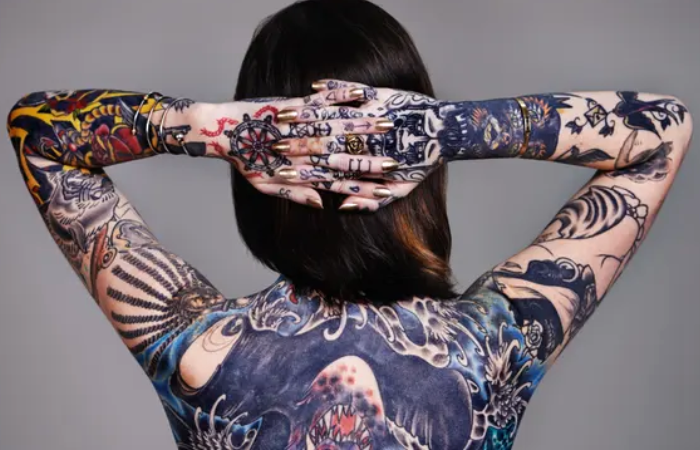
The Value of Scholarly Consultation
- Owing to the differences in viewpoints, Muslims should seek advice from a reliable scholar within their particular Islamic school of thought.
- When providing a more individualized viewpoint, academics might take into account unique situations and objectives.
Extra Things to Think About:
- Even if tattoos are considered acceptable, some academics stress that it's crucial to make sure they don't interfere with performing religious rites like wudu (washing) or ghusl (whole-body washing).
- Another factor could be the tattoo's content. Most scholars typically discourage using images or symbols that are derogatory to Islam.
Gaining knowledge about these reasons and factors enables one to approach tattoos within the Islamic context with greater knowledge.
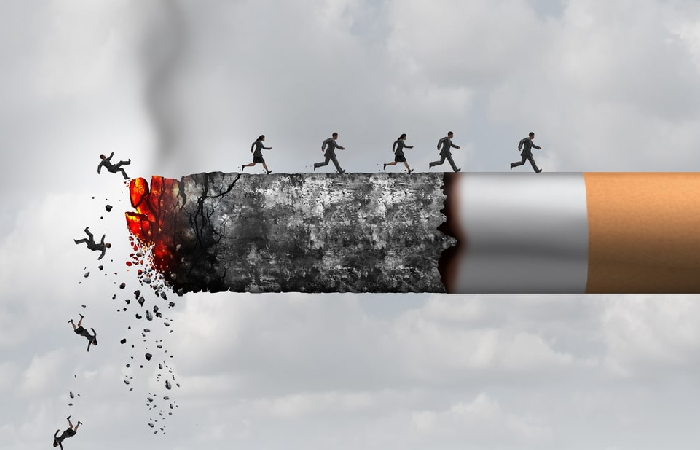
Understanding Risk and Precautions
- A permanent mark or design made on the skin using tattoo ink is called a tattoo. A portable tool that works like a sewing machine is used by tattoo artists.
- There are several skin-piercing needles on the gadget.
- With each puncture, the needles introduce tiny drips of ink into the epidermis.
- Tattoos cause minor discomfort and very little bleeding.
- Anesthetics, or painkillers, are often not used by tattoo artists as they create their artwork.
Potential Health Risks Associated with Tattooing
The Risks Involved:
-
During the tattoo application process, the skin is broken. Stated differently, skin infections and other health problems could develop later. The risks include:
-
Overly sensitive reactions: Tattoo ink side effects include skin allergies that cause itchy rashes at the tattoo site. This is possible even years after having inked. Red tattoo ink is more likely to trigger allergic reactions than other hues.
-
Skin conditions: After getting tattooed, you can develop a skin infection. This may be the result of tainted ink. It could also be from equipment that has not been adequately cleaned. Do not get tattooed at a studio that doesn't take the necessary safety procedures. Else you have a higher chance of getting a skin infection.
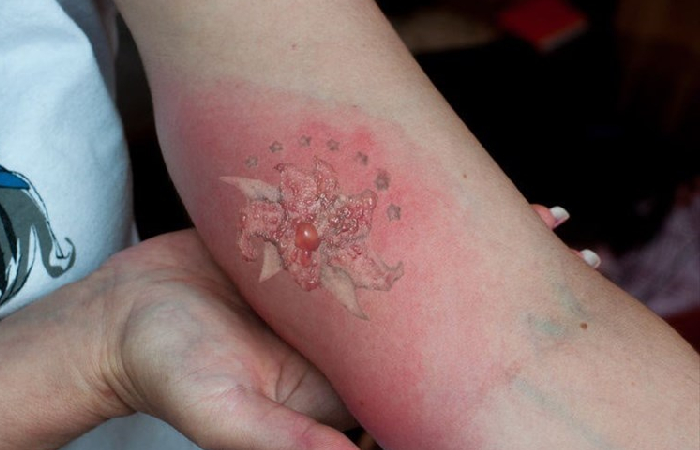
-
Other skin concerns: Occasionally, an inflammatory area may appear around tattoo ink. We call it a granuloma. Tattooing can also lead to keloids. The raised areas caused by scar tissue growth are called keloids.
-
Diseases can be spread by blood: If any parts of the tattoo come in contact with tainted blood, you can get a blood-borne infection. These infections include Staphylococcus aureus, hepatitis B, and C. To lower your risk, it's better to be immunized against hepatitis B before getting a tattoo.
-
Skin's reaction to an MRI: An MRI may cause excruciating pain in the tattooed area. At times, tattoos may degrade the quality of the MRI.
-
Problems with laser tattoo removal: Removing tattoos with a laser is a difficult procedure that can be costly, time-consuming, and may not erase the tattoo entirely. Scarring may also result from it.
-
You might require medication or other therapy if you develop an allergic reaction to your tattoo, an infection, or other health problems.
Take These Steps to Reduce the Risks:
- Select a Reputable Artist: Seek out a certified expert who adheres to hygienic regulations and utilizes sterile equipment. Request to view their portfolio and sterilization protocols.
- Recognize Aftercare: Healing and reducing the risk of infection depend on appropriate aftercare. Observe the cleaning, moisturizing, and preservation guidelines provided by the tattoo artist.
- Talk About Allergies: Let the artist know if you have any allergies, particularly to any drugs or dyes. On ink selections, they can offer advice.
- Recognize That Pain Is Real: Getting a tattoo can hurt, especially in sensitive places. Talk to the artist in advance about options for managing your pain.
Make Sure the Design Is Correct: A tattoo cannot be removed with a laser, if it is permanent. Select a layout that will provide you joy for many years to come.
Islamic Teachings on Safeguarding one's Health and well-being
Islamic principles place a significant importance on maintaining one's health and well-being. Here are some crucial Islamic teachings about this matter:
-
Being healthy is a blessing: Being healthy is a blessing from Allah (God). It is also known as نعمه (ni'mah). "Health and leisure time are two blessings that many people take for granted," remarked the prophet Muhammad (peace be upon him). This hadith shareef highlights the importance of prioritizing health and taking preventative action.
-
Taking care of one's body: Muslims believe that Allah gave them their bodies as a gift. They have reverence for their bodies. Creating wholesome routines is one aspect of it. This includes maintaining a healthy diet, getting enough sleep, and exercising frequently. The importance of hygiene is covered in many places in the Quran ([Quran 2:222]).
-
Everything in moderation: Islam strongly emphasizes moderation with regard to working, eating, and drinking. Thus, the likelihood of health problems due to excess is reduced.
-
Receiving medical attention: Those who are ill are recommended to receive medical attention. Reportedly, the guidance given by the Prophet Muhammad (peace be upon him) was to "seek treatment, for Allah has created a cure for every disease except one - old age." This proves that even while Allah has the final say over health, people should nevertheless make an effort to heal themselves.
-
Trust in Allah: Although Muslims understand the value of taking care of themselves, they yet have faith and confidence in Allah's plan. This helps to regulate stress and provides comfort in the face of illness.
These are some of the main tenets of Islam regarding maintaining well-being and good health. Muslims strive for a state of health that encompasses mental, emotional, and spiritual wellness.
Alternatives to Tattooing in Islam
Islamic beliefs can be reconciled with cultural and artistic activities.
- Islamic Architecture and Art: Islam has a long tradition of artistic expression that follows certain rules. Calligraphy, geometric patterns, and designs influenced by nature are common elements. Some interpretations also allow for music with spiritual meaning or without lyrics.
- Literature and Poetry: Islamic poetry has a long history of addressing themes of faith, love, and societal challenges. It is known for its beauty and wisdom. Here, too, calligraphy is important; poetry is written in calligraphy and adorns mosques and private items.
- Textile Arts & Crafts: Muslims have traditionally used geometric-patterned clothes, rugs, and decorative textiles as a means of artistic expression while still upholding Islamic values.

Respecting one's Identity and Body in Islam:
- Taking Care of Your Body: Islam holds that a person's body is a gift from God and ought to be respected. This entails dressing modestly, eating a balanced diet, and practicing basic cleanliness.
- Inner Beauty and Identity: Islam places a strong emphasis on the value of inner beauty and character, even though outside appearance does matter to some extent. It is highly regarded to cultivate virtues such as kindness, generosity, and compassion.
- Variations Within the Islamic Faith: The Muslim world is a big and varied one. Within Islam, there are various schools of thought, and regional variations in cultural traditions can be significant. It's critical to treat this variety with respect.
- Intention Matters: Islam emphasizes the significance of an action's intention. In general, self-expression that fosters moral principles and creativity is welcomed.
- Preventing Injury: Expressing oneself shouldn't put oneself or other people in danger. This entails refraining from actions such as encouraging violence, being immodest, or disrespecting holy symbols.
- Muslims can discover numerous unique and meaningful ways to express themselves within the Islamic framework by adhering to these guidelines.
Conclusion
Islamic beliefs can be reconciled with cultural and artistic activities.
- Some scholars view tattooing as prohibited since it permanently alters the body. Temporary henna tattoos are OK.
- It is advised to speak with an expert for their particular interpretation.
- Islam prioritizes moral behavior and human development.
- By respecting the bounds established by Islamic teachings and remaining faithful to your faith, you can express yourself authentically.
- In Islam, respecting your identity and body is essential. It encourages inner beauty, modesty, and respect for the variety of the Muslim world.
- Key concepts include intention and preventing injury. Be creative in your expression, but maintain moral principles and refrain from anything that can be construed as insulting or offensive.
- Motivating Oneself to Seek Information and Understanding
Nuance can be found in matters of Halal (allowed) and Haram (forbidden). This is how you move through them:
- Seek advice from respectable Islamic scholars or groups by consulting scholarly resources. There are plenty of sites that can offer concise explanations on the internet and in mosques.
- Depending on the situation, some actions may be acceptable or inappropriate. Speak with an expert to get a more tailored understanding based on your unique circumstances.
- Islam promotes lifelong learning, as it recognizes the importance of knowledge acquisition. Continue to be inquisitive, raise questions, and broaden your comprehension of Islamic teachings.
By including Islam in everyday Life, You can live a happy and meaningful life. Incorporating Islamic teachings into your daily decisions is the key to this approach.








